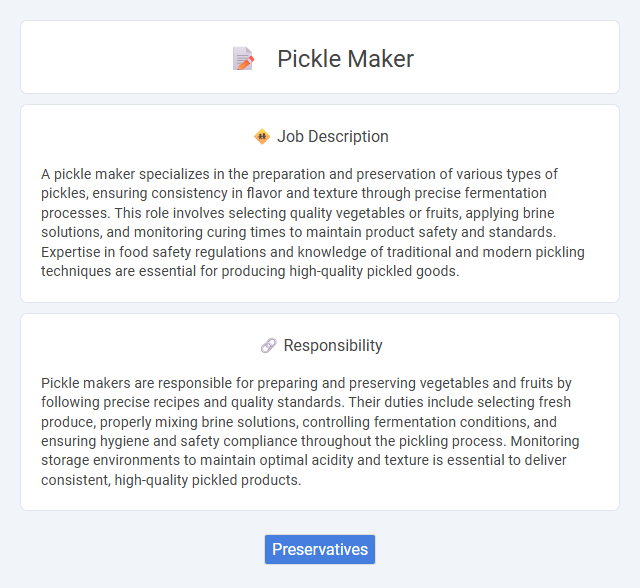
A pickle maker specializes in the preparation and preservation of various types of pickles, ensuring consistency in flavor and texture through precise fermentation processes. This role involves selecting quality vegetables or fruits, applying brine solutions, and monitoring curing times to maintain product safety and standards. Expertise in food safety regulations and knowledge of traditional and modern pickling techniques are essential for producing high-quality pickled goods.
Individuals with strong hand-eye coordination and patience are likely suitable for a pickle maker job due to the repetitive nature of the tasks involved. People who can handle prolonged periods of standing and moderate manual labor may find this role physically manageable. Those with sensitivities to strong odors or allergens could probably face challenges in this work environment.
Qualification
A pickle maker typically requires a strong understanding of food safety standards and experience in food preservation techniques, including fermentation and brining. Proficiency in operating industrial food processing equipment and knowledge of hygiene protocols are essential qualifications. Certifications in food handling or quality control further enhance a candidate's suitability for this role.
Responsibility
Pickle makers are responsible for preparing and preserving vegetables and fruits by following precise recipes and quality standards. Their duties include selecting fresh produce, properly mixing brine solutions, controlling fermentation conditions, and ensuring hygiene and safety compliance throughout the pickling process. Monitoring storage environments to maintain optimal acidity and texture is essential to deliver consistent, high-quality pickled products.
Benefit
Working as a pickle maker may likely offer benefits such as steady employment in the food production industry and skill development in food preservation techniques. Employees might also gain experience with quality control and small-batch food processing, which could enhance future job prospects. The role could provide opportunities for creative input in developing new flavors and products, potentially leading to job satisfaction and growth.
Challenge
The pickle maker job likely involves consistent challenges related to maintaining product quality and ensuring the precise balance of ingredients to achieve the desired flavor. Managing large batches under varying raw material conditions may pose difficulties requiring quick adjustments and a deep understanding of the fermentation process. Attention to cleanliness and safety standards probably remains critical to avoid contamination and uphold industry regulations.
Career Advancement
A career as a pickle maker offers opportunities for growth within the food processing industry, including roles such as quality control supervisor, production manager, and flavor development specialist. Expertise in fermentation techniques and knowledge of food safety standards can lead to positions in product innovation and process optimization. Continuous skill development in supply chain management and regulatory compliance enhances prospects for senior management and entrepreneurial ventures in artisanal pickle brands.
Key Terms
Preservatives
Pickle makers expertly blend specific preservatives such as sodium benzoate and potassium sorbate to extend shelf life and maintain flavor integrity. These professionals ensure the correct concentration of natural preservatives like vinegar and salt is used to inhibit microbial growth effectively. Mastery of preservative application directly impacts product safety, quality, and consumer satisfaction in the pickling industry.
 kuljobs.com
kuljobs.com